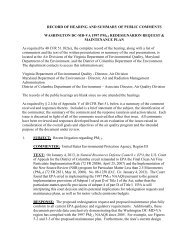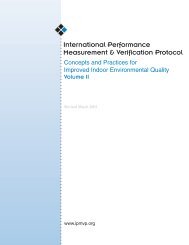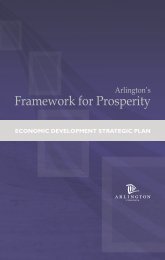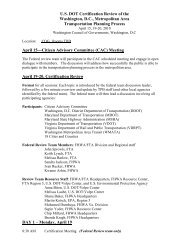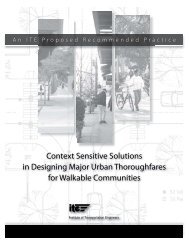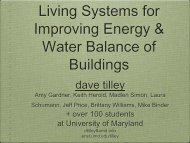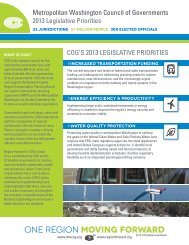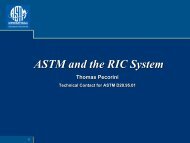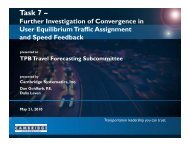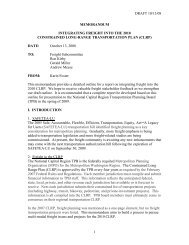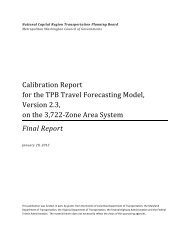PTI Local Government Energy Assurance Guidelines - Metropolitan ...
PTI Local Government Energy Assurance Guidelines - Metropolitan ...
PTI Local Government Energy Assurance Guidelines - Metropolitan ...
Create successful ePaper yourself
Turn your PDF publications into a flip-book with our unique Google optimized e-Paper software.
3.12.2 Keep Abreast of Ongoing Market/Supply Chain Issues<br />
Once the EAP is completed and implementation has begun, it is time to begin the process of keeping current on<br />
energy assurance topics and energy markets in general. This can be a rewarding, educational, and exciting task if<br />
approached correctly.<br />
Incorporate energy assurance educational efforts into routines by setting aside time for reading, attending<br />
informational webinars and stakeholder meetings, and researching other related ways to stay abreast of energy<br />
assurance developments. Between rapidly changing energy supply and demand technologies, event-spurred energy<br />
price changes, lessons learned on a weekly basis by other local governments, new funding opportunities, new State<br />
and Federal energy assurance initiatives, new energy emergencies, and changes in the local government energy<br />
picture, there are plenty of topics that are worth monitoring.<br />
The <strong>Energy</strong> Information Administration 44 is an excellent resource for staying current. The EIA has a yearly ‘energy<br />
outlook’ website 45 that contains forward-looking information ontrends and issues germane to energy markets.<br />
DOE/OE produces the “<strong>Energy</strong> <strong>Assurance</strong> Daily” (available free of charge at: http://www.oe.netl.doe.gov/ead.aspx ),<br />
which planners can access to keep their knowledge of changing conditions current. 46 The EAD covers several areas:<br />
■■<br />
■■<br />
■■<br />
■■<br />
Major energy developments<br />
Electricity, petroleum, and natural gas industries<br />
Other relevant news<br />
<strong>Energy</strong> prices<br />
Preparing a Brief, Electronic “<strong>Energy</strong> <strong>Assurance</strong> Update” Newsletter<br />
The energy assurance coordinator can be responsible for keeping current with these topics and others, and it is<br />
helpful when the coordinator forwards relevant electronic and hard copy information to the working group members,<br />
and/or the core group of energy assurance stakeholders going forward. It is a good idea to start, and institutionalize, a<br />
short bi-weekly or monthly electronic “energy assurance newsletter” that can be sent to the people and organizations<br />
that should stay connected to the energy assurance project well into the future.<br />
Keeping key energy assurance organizations and individuals current requires time and effort. The goal is to create an<br />
educated, active community of individuals and organizations interested in supporting and keeping abreast of local<br />
energy assurance efforts. Quarterly informal or formal meetings may be useful in keeping energy assurance on the<br />
radar screens of key individuals and organizations. The energy assurance coordinator can also bring information to<br />
these individuals and organizations through energy-related course curricula, webinars, meetings, workshops, blogs,<br />
training exercises, and other avenues.<br />
Conducting/Developing Curricula, Webinars, Meetings, Workshops, Blogs, Training Tools,<br />
and Exercises<br />
When possible, it makes sense for the coordinator to attend community college and/or four-year college classes<br />
related to energy assurance. The information learned from this curriculum can be used to inform and educate others<br />
44<br />
http://www.eia.doe.gov/.<br />
45<br />
http://www.eia.doe.gov/forecasts/aeo/index.cfm?featureclicked=1&.<br />
46<br />
http://www.oe.netl.doe.gov/ead.aspx.<br />
76 | 3 – How to Develop or Enhance a <strong>Local</strong> <strong>Energy</strong> <strong>Assurance</strong> Plan



